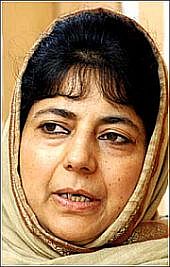 After almost five hours of discussions at the prime minister's all-party meeting in New Delhi on Wednesday, a solution is yet to be found to the raging violence in Kashmir. The meeting, however, did pacify regional parties in the Valley, with both the People's Democratic Party and National Conference saying they were 'not disappointed with the talks'.
After almost five hours of discussions at the prime minister's all-party meeting in New Delhi on Wednesday, a solution is yet to be found to the raging violence in Kashmir. The meeting, however, did pacify regional parties in the Valley, with both the People's Democratic Party and National Conference saying they were 'not disappointed with the talks'.
The main opposition party, the PDP, had earlier rejected offers for talks in the capital. This time, a five-member delegation led by the party chief Mehbooba Mufti attended the meeting to find a solution to the three-months-long violence in Kahsmir, which has seen 88 deaths so far.
In a post meeting chat with rediff.com's Sahim Salim, Mufti talked about the deteriorating situation in Kashmir and 'how the only way forward is to reach a consensus between opposing factions in the Valley'.
You have had a long meeting with leaders from different parties. Has a way forward come out?
At today's meeting, we got a chance to talk about the situation Jammu and Kashmir to a galaxy of leaders in New Delhi. We also reiterated that a solution to the violence will have to come from the present leadership.
We emphasised on the importance of understanding this as a humanitarian crisis and that we needed a very dignified solution. We have put our points across, now it is upto the leadership to understand that the people of Kashmir are its own and come out with a solution.
The government tried various measures to try and control the situation, but it only seems to get worse with each passing day. Do you think that the state government was totally incapable of handling the situation?
The problem in Jammu and Kashmir is very complex. Right now what it needed is a proper peace process, like the one that was initiated by former prime minister (Atal Bihari) Vajpayeeji, in which talks were conducted with Pakistan and with the Hurriyat leaders.
Earlier, the deputy prime minister L K Advani and the Hurriyat leaders had two rounds of talks that marked initiation of a peace process. That process has completely stopped under the leadership of the present government. From what I understand, unless there are unconditional talks, we cannot arrive at a solution. The government should at least release the young boys who are behind bars.
Can you elaborate more on the 'unconditional talks'?
See, a consensus has to be reached. Like in 2007, the PDP had demanded that the Armed Forces Special Provisions Act be revoked, because the situation was normalising and some confidence building measures had to take place.
There are certain points that hardline Hurriyat leader Syed Ali Shah Geelani (the five point program initiated by Geelani) that can be taken into account for a present consensus. Demands by other leaders should be taken into account as well. New Delhi should involve everyone in talks, especially the separatists, so that a consensus can be reached to take the talks forward.
A major issue currently is the AFSPA of 1958. Do you think revoking it completely is a solution to the present situation?
When the PDP had initiated the revoking of the AFSPA, the situation was much better in the Valley. It was a very natural thing to do at that point. In 2008 elections, 60 per cent people had turned up to vote. Right after that, revoking the ASPA should have been the natural thing to do for the present government.
Now the situation has completely worsened. Today, we need some concrete changes in the ASPA, not cosmetic ones.
The Centre keeps reiterating that talks are possible only if there is a violence free atmosphere. The state, however, has not been able to stop the violence. Do you think Omar Abdullah, as the chief minister, should step down for having failed to curb the violence?
The situation is Kashmir is very bad. Many people have died, the condition of the injured is pathetic and people are fed up with the curfew. Omar Abdullah's government has failed on all fronts.
The Cabinet Committee on Security meeting itself said that it was a problem of governance. Now it is upto the Congress and the NC to decide the way forward. My intention in coming here, however, was not to guide the leadership about this. Instead, I wanted to interact with different leaders about the situation in J&K. I wanted to educate them of the ground situation there.
Image: PDP chief Mehbooba Mufti





